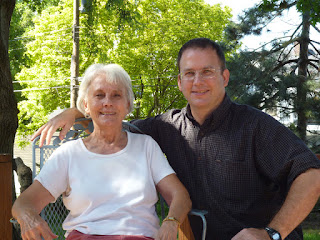Voices of Alzheimer’s: Patrick and His Mother
When Patrick’s mother was diagnosed
with Early-onset Alzheimer’s Disease eight
years ago at the age of 64, Patrick paused his career in academia and moved
home to be her primary caregiver.
Over the years, Patrick’s roles as
son and caregiver have blended, though keeping them separate is important to
how he interacts with his mother. This
is a major challenge for many family caregivers. Patrick explained about his mother, “She
always viewed herself as independent and strong. Even now that her strength and
independence are diminishing, she still clings to that self-image. That is
heartening, in one sense, but heart breaking in another. She won’t admit that
she has memory problems and will not accept the idea that I am her caregiver.
So we maintain a façade that I’m just visiting for a while, between jobs.
However the moments do come when it’s obvious that I’m in charge and that she
needs me to take care of the household. When it comes to that, she turns into a
kitten and treats me like I’m not her son anymore – just a big helpful man. I’m
having to be flexible in the way I see my role. I basically let her determine
it. I have the advantage in knowing that this is a temporary situation and that
my role will return to a comfortable state eventually.
“Two of the things my mom always
valued in me was intelligence and humor. It was how we related. We shared an
appreciation for wit – we could laugh together, and it made me feel close to
her. It’s painful for me to watch her search for the right word, especially
when I can tell that she really wants to contribute a snappy response the way
she did before.
“I’ve become more grim and dour but
I don’t necessarily see that as a bad thing. In the past I have tried my best
to avoid ‘ugly’ emotions, so it’s kind of a relief to be open about them now. I
do feel my joie de vivre has diminished and I understand that situational
depression may be normal for someone in my position, so I trust that it will
return after this situation is over. It is harder for me to laugh at myself and
to accept other peoples’ bad behavior, and yet I have a deeper understanding of
my spirituality and I enjoy a more profound feeling of connection with other
people. I also feel I have gained a longer view of my life than I had before –
more patience – and I feel more comfortable relying on faith. Those qualities
may have arisen eventually anyway, but I do believe my mother has been teaching
me a lot about compassion.
“I guess the best way to explain
anything like this would be by analogy. I did, actually come up with one recently
because I’ve been reading C.S. Forester’ Hornblower books. If you haven’t read
them, they are about an English sailor during the Napoleonic wars who, as the
series progresses, becomes a ship captain. As I read his adventures I get an
idea about what it must have been like to maintain a sea-going vessel during
those times. I’m not saying that I am like a ship captain – it’s more like I
shift my roles from sailor to sailor as the conditions change. This analogy
works well because I have actually assembled caregiving team much like a ship’s
crew. I couldn’t do this whole job if I was acting alone. I can only perform
the task at hand that I’ve trained for. If I can’t do it, I find someone who
can.”
For caregivers in similar
situations, Patrick offered this advice, “Don’t try to be the model caregiver.
Just do what you can and ask for help.”
 |
| Patrick and his mother, 2011 |
Through all the stress, heartbreak,
and doubt, Patrick and his mother still share moments of laughter.
“We both appreciate cuteness and
absurdity, and I have found the best source for both of those qualities is by
watching dogs playing. That is when spontaneous laughter erupts from both of
us.”

Comments
Post a Comment